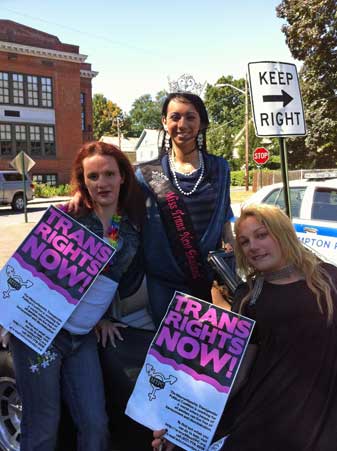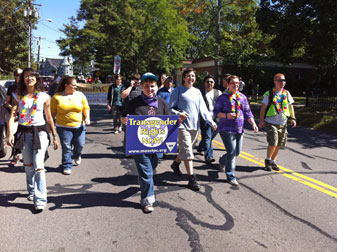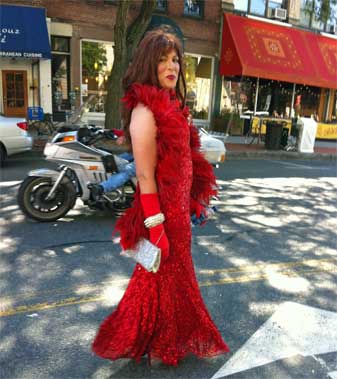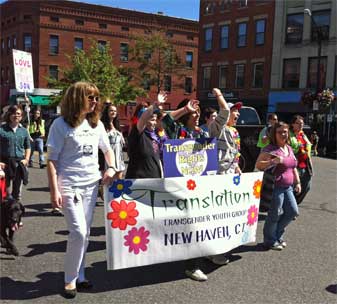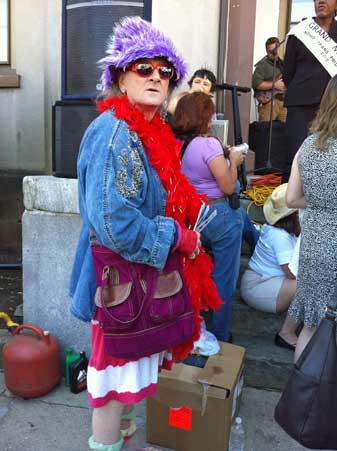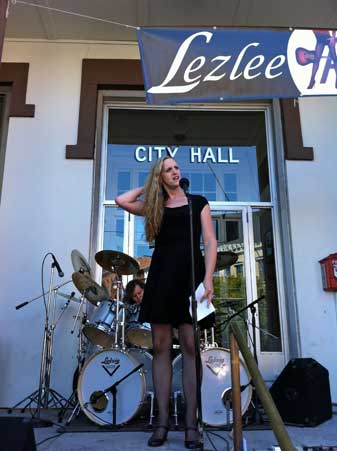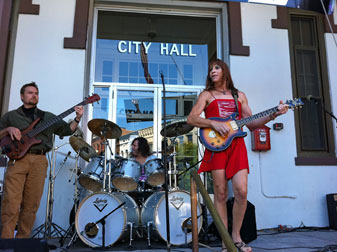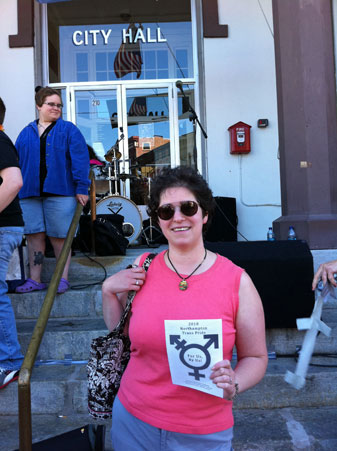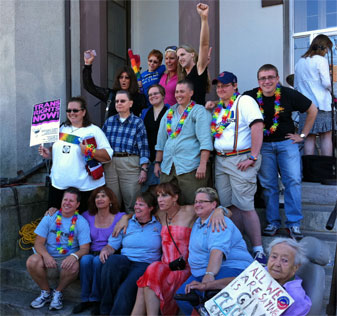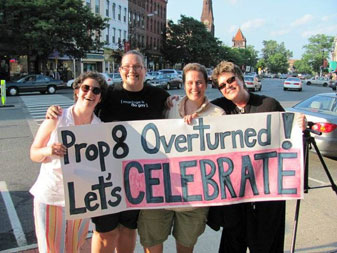After the federal court overturned California’s Prop 8 gay marriage ban earlier this month, conservative New York Times columnist Ross Douthat lamented the passing of a certain ideal of the family:
This ideal holds up the commitment to lifelong fidelity and support by two sexually different human beings — a commitment that involves the mutual surrender, arguably, of their reproductive self-interest — as a uniquely admirable kind of relationship. It holds up the domestic life that can be created only by such unions, in which children grow up in intimate contact with both of their biological parents, as a uniquely admirable approach to child-rearing.
Note the odd specificity of this “ideal”. Why “sexually different” (have you ever met two partners who were sexually identical?), and why “biological parents”? These ethically irrelevant qualifiers must be thrown in to preserve the tenuous distinction between procreative straight couples and everyone else.
I agree with Douthat, and with conservative defenders of marriage, that society does have an interest in channeling the disruptive force of sexual desire into stable relationships, surrounding physical intimacy with emotional safety, and orienting lovers toward a future that extends beyond their desires of the moment. Christians should want to strengthen marriage because it can promote integration of body and spirit. Sex without a long-term investment in your partner’s well-being presents a temptation to ignore the golden rule that one should treat others as an end in themselves, not a means to an end.
Thus far, we’re still in the realm of ethics — behavioral standards based on evidence of what is or isn’t conducive to human flourishing. We can express our judgments about marriage versus other sexual arrangements, in hopes that this will encourage responsible choices. But Douthat also wants to make judgments about types of people, deeming one group superior to another, although this serves no purpose because the differences between them are biological and beyond their control. Stigma will not deter the disfavored way of being; at best, it’s a very un-Christian appeal to pride as an inducement for straight married couples to be faithful spouses and parents.
Gay political columnist Andrew Sullivan responds on his blog, The Daily Dish:
…Ross’ argument simply ignores the existence and dignity and lives and testimony of gay people. This is strange because the only reason this question has arisen at all is because the visibility of gay family members has become now so unmissable that it cannot be ignored. Yes, marriage equality was an idea some of us innovated. But it was not an idea plucked out of the sky. It was an attempt to adapt to an already big social change: the end of the homosexual stigma, the emergence of gay communities of great size and influence and diversity, and collapse of the closet. It came from a pressing need as a society to do something about this, rather than consign gay people to oblivion or marginalization or invisibility. More to the point, it emerged after we saw what can happen when human beings are provided no structure, no ideal, and no support for responsibility and fidelity and love.
If you have total gay freedom and no gay institutions that can channel love and desire into commitment and support, you end up in San Francisco in the 1970s. That way of life – however benignly expressed, however defensible as the pent-up unleashed liberation of a finally free people – helped kill 300,000 young human beings in this country in our lifetime. Ross may think that toll is unimportant, or that it was their fault, but I would argue that a Catholic’s indifference to this level of death and suffering and utter refusal to do anything constructive to prevent it happening again, indeed a resort to cruel stigmatization of gay people that helps lead to self-destructive tendencies, is morally evil.
What, in other words, would Ross have gay people do? What incentives would he, a social conservative, put in place to encourage gay couples and support them in their commitments and parenting and love? Notice the massive silence. He is not a homophobe as I can personally attest. But if he cannot offer something for this part of our society except a sad lament that they are forever uniquely excluded, by their nature, from being a “microcosm of civilization”, then this is not a serious contribution to the question at hand. It is merely a restatement of abstract dogma – not a contribution to the actual political and social debate we are now having.
We gays are here, Ross, as you well know. We are human beings. We love one another. We are part of countless families in this country, pay taxes, work hard, serve the country in the armed services, and look after our own biological children (and also those abandoned by their biological parents). Our sex drives are not going away, nor our need to be included in our own families, to find healing and growth and integration that alone will get us beyond the gay-straight divide into a more humane world and society.
Or are we here solely to act as a drop-shadow to the ideal heterosexual relationship?
…
I don’t share much of my personal life on this blog. Regular readers know that I was raised by two moms. But I’d like to speak up now on behalf of another group that’s also slighted by the biology-obsession of the Prop 8 crowd: Adoptive families.
One would think that social conservatives, being pro-life, would want to encourage adoption as an alternative to pregnancy termination. But their rhetoric on gay marriage ties them in knots. As Sullivan observes, gay couples are parents too. The only way to tell them apart is to elevate procreative ability to a spiritual ideal. Inadvertently perhaps, this attitude wounds and discourages potential adoptive parents, reinforcing our fear that infertility is a kind of failure, an exclusion from the highest level of sacred marital union.
As my husband and I have proceeded on our journey to build our family through adoption, we’ve become sensitized to this fertility bias. “Don’t you want to try to have your own children?” well-meaning acquaintances might say. (What do you think we’re doing?)
Through extensive reading and conversations with other families, we’ve also become convinced that an open adoption–where the birthparents are an ongoing part of the child’s life–is beneficial for all parties, especially the child. This too can be a hard sell to friends and relatives shaped by the one-mommy-one-daddy culture. It gives Heather Has Two Mommies a whole new meaning.
I found an unlikely soulmate in sex columnist Dan Savage. In his open adoption memoir The Kid: What Happened After My Boyfriend and I Decided to Go Get Pregnant, he describes attending an adoption education seminar with a group of infertile straight couples. While the others were grieving the loss of the biological child they’d expected, he and Terry were thrilled that, as gay men, their civil rights had progressed to the point that they could start a family at all. Savage speculates that a lifetime of hearing heteronormative rhetoric contributed to his straight companions’ identity crisis and exacerbated the pain of infertility (boldface emphasis mine):
Heterosexual identity is all wrapped up in the ability of heterosexuals to make babies. Straight sex can do what gay sex cannot, make “miracles.” The straights at our seminar had expected to grow up, fall in love, get married, make love for fun, and sooner or later make love to make life. Infertility did more than shatter their expectations; it undermined their sexual identities.
Straight sex can be recreational or procreational–or both–but gay sex can only ever be recreational. Gay sex is never a means, only an end, and the end is pleasure. Homophobes use this to justify their hatred of gays and lesbians: straight sex, since it can make a baby, is “natural”; gay sex, since it can only make a mess, is not. Babies make straight sex more important than gay sex, so straights are therefore more important than gays. Babies underpin all hetero-supremacism, from “Adam and Eve, not Adam and Steve” to “Gays don’t have children, so they have to recruit yours.” Even when straights are using birth control, procreation still sanctifies straight sex. Even when straights are having sex that couldn’t possibly make babies (oral, anal, phone, cyber), the fact that these two people could make babies under other circumstances or in other positions legitimizes straight sex.
This is pounded into the heads of gay people and straight people alike. Gays grow up believing that their desires, pleasures, and loves are illegitimate; and straights who fall for the hype believe they gotta work that magic, gotta make that baby, or…what? A straight person who can’t make a baby isn’t really a straight person at all. And if you’re not straight, you must be…what? You’re like my boyfriend and me. Suddenly your sex is all recreational, like gay sex, delegitimized and desanctified. Oh, it’s an expression of love–but so is gay sex, and that never made gay sex okay. No babies means no miracles, no magic. The sex you’re having may still be pleasurable, but in a sex-hating (and consequently sex-obsessed) culture, pleasure is not a good enough reason, otherwise gay and lesbian sex would never have been stigmatized.
I sympathized with the straight people sitting around the conference table. I understood what they must have been going through. I had been through it myself, a long time ago. When I hit puberty, I got the news that I was functionally infertile. But the straight couples at the seminar had only recently gotten that news, and they were still adjusting to it. How much we had in common with them was driven home by the rhetoric the counselors used during the seminar. It was the rhetoric of coming out. The straight couples were encouraged to accept what they could not change. In time, they’d see their “problem” as a blessing. It was important to tell family and friends the truth, even if they might not understand at first. They might in their ignorance ask hurtful questions, but be patient and try to answer. And while it is possible to live a lie, possible to adopt a child and pass it off as your biological child, no one can spend a lifetime in the closet.
Now we all had some common ground.
(pp.25-26)
